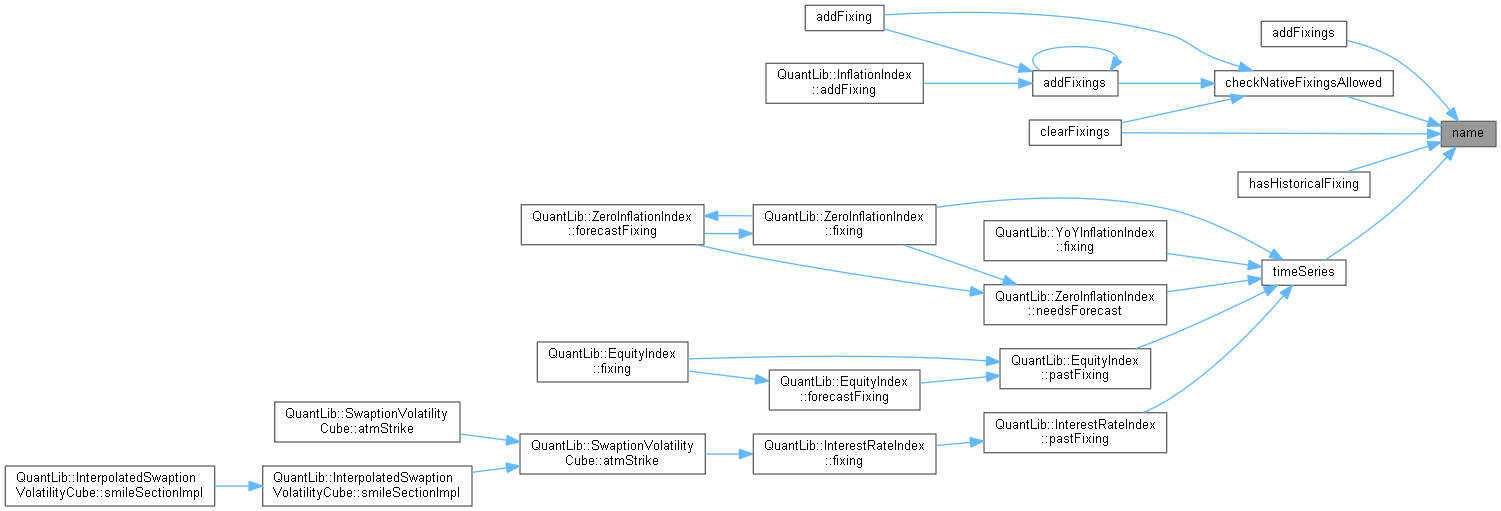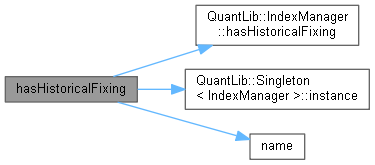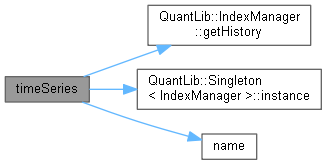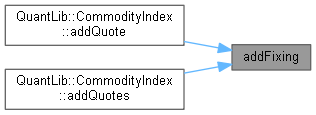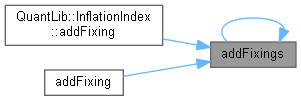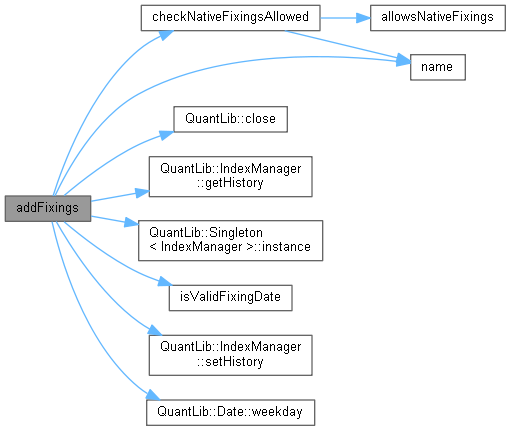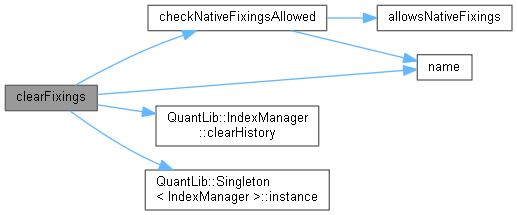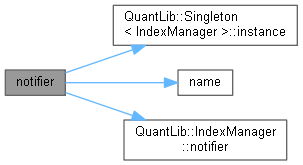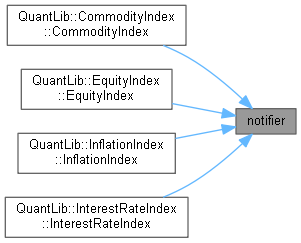purely virtual base class for indexes More...
#include <index.hpp>
 Inheritance diagram for Index:
Inheritance diagram for Index: Collaboration diagram for Index:
Collaboration diagram for Index:Public Member Functions | |
| ~Index () override=default | |
| virtual std::string | name () const =0 |
| Returns the name of the index. More... | |
| virtual Calendar | fixingCalendar () const =0 |
| returns the calendar defining valid fixing dates More... | |
| virtual bool | isValidFixingDate (const Date &fixingDate) const =0 |
| returns TRUE if the fixing date is a valid one More... | |
| bool | hasHistoricalFixing (const Date &fixingDate) const |
| returns whether a historical fixing was stored for the given date More... | |
| virtual Real | fixing (const Date &fixingDate, bool forecastTodaysFixing=false) const =0 |
| returns the fixing at the given date More... | |
| virtual Real | pastFixing (const Date &fixingDate) const |
| returns a past fixing at the given date More... | |
| const TimeSeries< Real > & | timeSeries () const |
| returns the fixing TimeSeries More... | |
| virtual bool | allowsNativeFixings () |
| check if index allows for native fixings. More... | |
 Public Member Functions inherited from Observable Public Member Functions inherited from Observable | |
| Observable ()=default | |
| Observable (const Observable &) | |
| Observable & | operator= (const Observable &) |
| Observable (Observable &&)=delete | |
| Observable & | operator= (Observable &&)=delete |
| virtual | ~Observable ()=default |
| void | notifyObservers () |
 Public Member Functions inherited from Observer Public Member Functions inherited from Observer | |
| Observer ()=default | |
| Observer (const Observer &) | |
| Observer & | operator= (const Observer &) |
| virtual | ~Observer () |
| std::pair< iterator, bool > | registerWith (const ext::shared_ptr< Observable > &) |
| void | registerWithObservables (const ext::shared_ptr< Observer > &) |
| Size | unregisterWith (const ext::shared_ptr< Observable > &) |
| void | unregisterWithAll () |
| virtual void | update ()=0 |
| virtual void | deepUpdate () |
Observer interface | |
stores the historical fixing at the given date the date passed as arguments must be the actual calendar date of the fixing; no settlement days must be used. | |
| void | update () override |
| virtual void | addFixing (const Date &fixingDate, Real fixing, bool forceOverwrite=false) |
| void | addFixings (const TimeSeries< Real > &t, bool forceOverwrite=false) |
| stores historical fixings from a TimeSeries More... | |
| template<class DateIterator , class ValueIterator > | |
| void | addFixings (DateIterator dBegin, DateIterator dEnd, ValueIterator vBegin, bool forceOverwrite=false) |
| stores historical fixings at the given dates More... | |
| void | clearFixings () |
| clears all stored historical fixings More... | |
| ext::shared_ptr< Observable > | notifier () const |
| void | checkNativeFixingsAllowed () |
| check if index allows for native fixings More... | |
Additional Inherited Members | |
 Public Types inherited from Observer Public Types inherited from Observer | |
| typedef set_type::iterator | iterator |
Detailed Description
purely virtual base class for indexes
- Warning:
- this class performs no check that the provided/requested fixings are for dates in the past, i.e. for dates less than or equal to the evaluation date. It is up to the client code to take care of possible inconsistencies due to "seeing in the future"
Constructor & Destructor Documentation
◆ ~Index()
|
overridedefault |
Member Function Documentation
◆ name()
|
pure virtual |
Returns the name of the index.
- Warning:
- This method is used for output and comparison between indexes. It is not meant to be used for writing switch-on-type code.
Implemented in CommodityIndex, EquityIndex, InflationIndex, and InterestRateIndex.
 Here is the caller graph for this function:
Here is the caller graph for this function:◆ fixingCalendar()
|
pure virtual |
returns the calendar defining valid fixing dates
Implemented in CommodityIndex, EquityIndex, InflationIndex, and InterestRateIndex.
◆ isValidFixingDate()
returns TRUE if the fixing date is a valid one
Implemented in InflationIndex, CommodityIndex, BMAIndex, EquityIndex, and InterestRateIndex.
 Here is the caller graph for this function:
Here is the caller graph for this function:◆ hasHistoricalFixing()
◆ fixing()
|
pure virtual |
returns the fixing at the given date
the date passed as arguments must be the actual calendar date of the fixing; no settlement days must be used.
Implemented in CommodityIndex, EquityIndex, ZeroInflationIndex, YoYInflationIndex, InterestRateIndex, and InflationIndex.
 Here is the caller graph for this function:
Here is the caller graph for this function:◆ pastFixing()
returns a past fixing at the given date
the date passed as arguments must be the actual calendar date of the fixing; no settlement days must be used.
Reimplemented in SwapSpreadIndex, ZeroInflationIndex, YoYInflationIndex, and InflationIndex.
Definition at line 131 of file index.hpp.
 Here is the call graph for this function:
Here is the call graph for this function: Here is the caller graph for this function:
Here is the caller graph for this function:◆ timeSeries()
| const TimeSeries< Real > & timeSeries | ( | ) | const |
returns the fixing TimeSeries
Definition at line 71 of file index.hpp.
 Here is the call graph for this function:
Here is the call graph for this function: Here is the caller graph for this function:
Here is the caller graph for this function:◆ allowsNativeFixings()
|
virtual |
check if index allows for native fixings.
If this returns false, calls to addFixing and similar methods will raise an exception.
Reimplemented in SwapSpreadIndex.
Definition at line 80 of file index.hpp.
 Here is the caller graph for this function:
Here is the caller graph for this function:◆ update()
|
overridevirtual |
This method must be implemented in derived classes. An instance of Observer does not call this method directly: instead, it will be called by the observables the instance registered with when they need to notify any changes.
Implements Observer.
Definition at line 136 of file index.hpp.
 Here is the call graph for this function:
Here is the call graph for this function:◆ addFixing()
Reimplemented in InflationIndex.
Definition at line 24 of file index.cpp.
 Here is the call graph for this function:
Here is the call graph for this function: Here is the caller graph for this function:
Here is the caller graph for this function:◆ addFixings() [1/2]
| void addFixings | ( | const TimeSeries< Real > & | t, |
| bool | forceOverwrite = false |
||
| ) |
stores historical fixings from a TimeSeries
the dates in the TimeSeries must be the actual calendar dates of the fixings; no settlement days must be used.
Definition at line 31 of file index.cpp.
 Here is the call graph for this function:
Here is the call graph for this function: Here is the caller graph for this function:
Here is the caller graph for this function:◆ addFixings() [2/2]
| void addFixings | ( | DateIterator | dBegin, |
| DateIterator | dEnd, | ||
| ValueIterator | vBegin, | ||
| bool | forceOverwrite = false |
||
| ) |
◆ clearFixings()
| void clearFixings | ( | ) |
◆ notifier()
|
protected |


